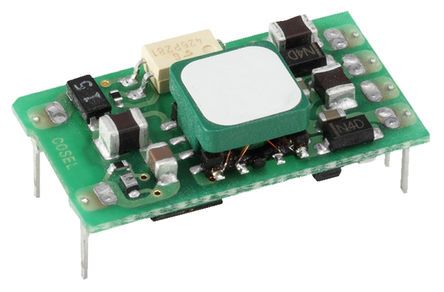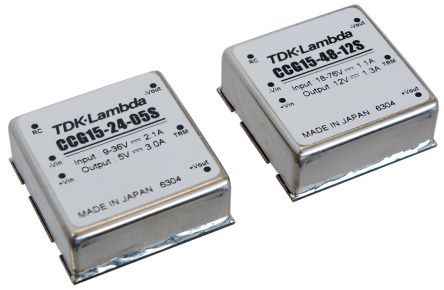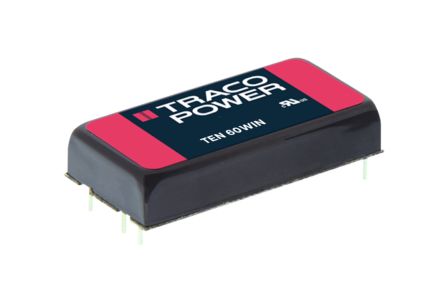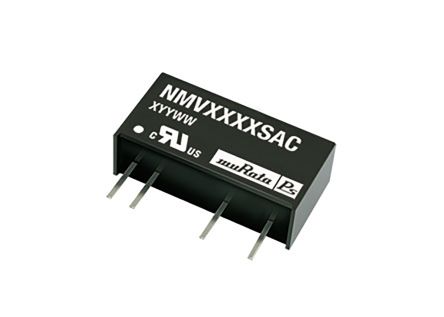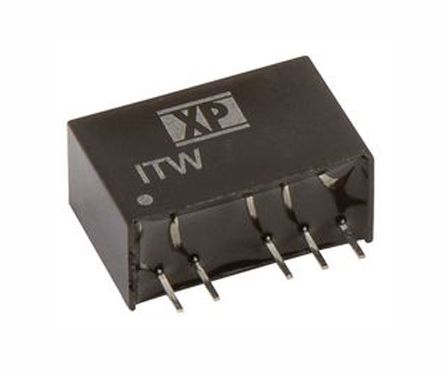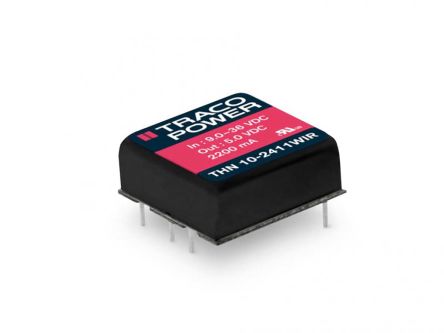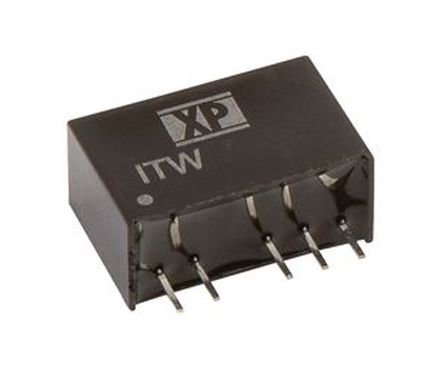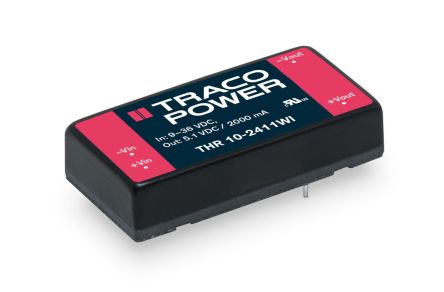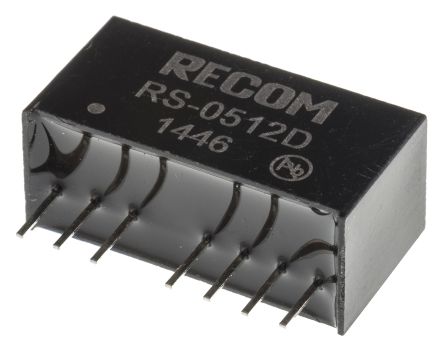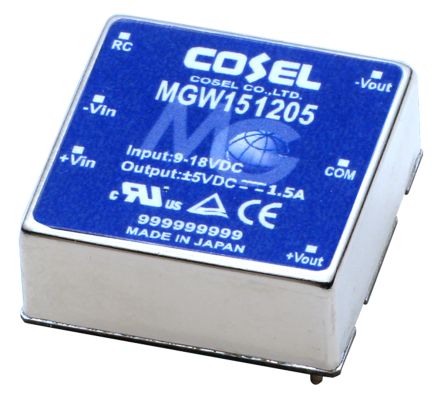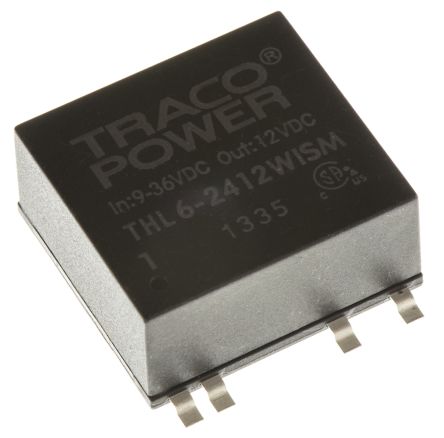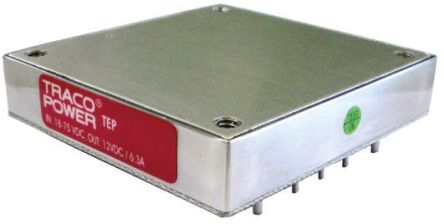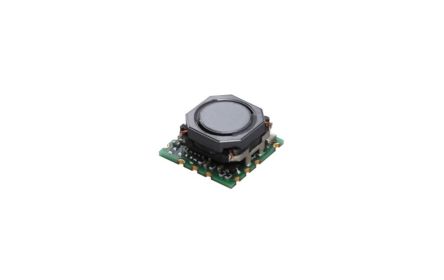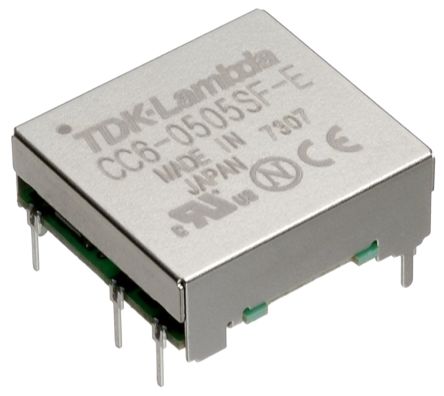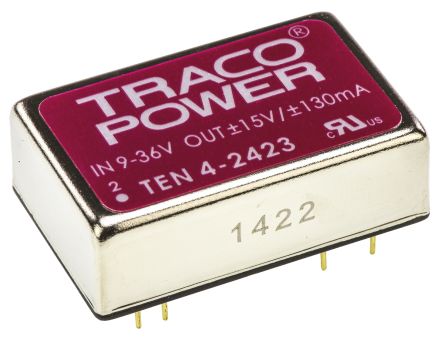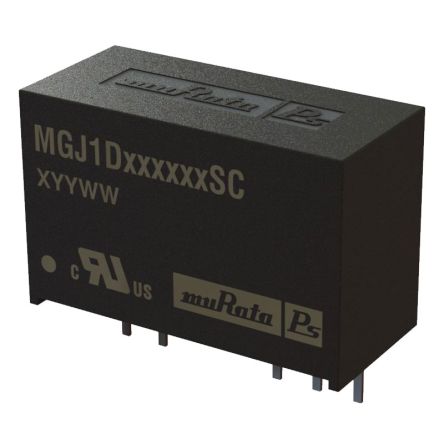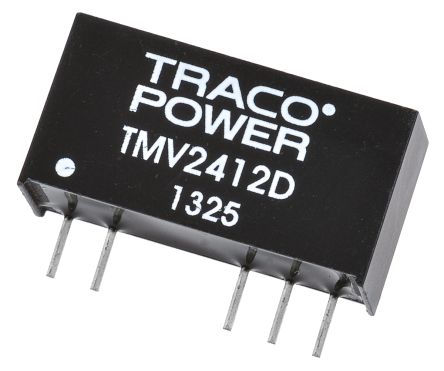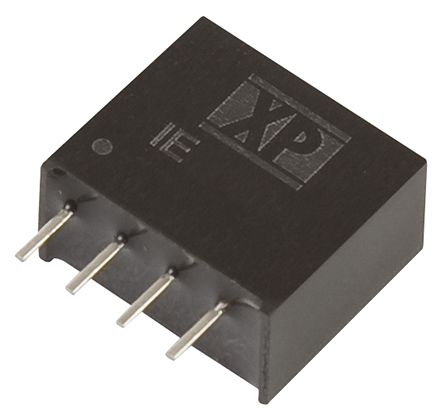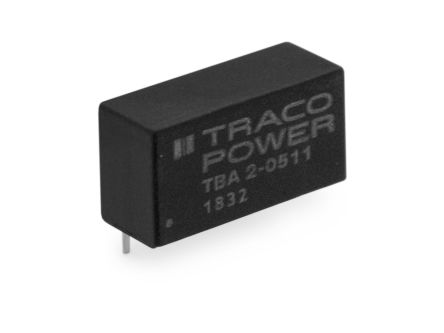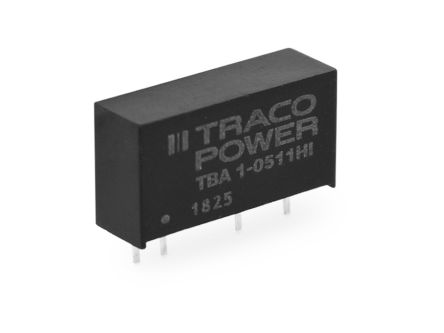- Automation & Control Gear
- Cables & Wires
- Enclosures & Server Racks
- Fuses & Circuit Breakers
- HVAC, Fans & Thermal Management
- Lighting
- Relays & Signal Conditioning
- Switches
- Batteries & Chargers
- Connectors
- Displays & Optoelectronics
- ESD Control, Cleanroom & PCB Prototyping
- Passive Components
- Power Supplies & Transformers
- Raspberry Pi, Arduino, ROCK, STEM Education & Development Tools
- Semiconductors
DC-DC Converters
Isolated DC-DC converters convert a source of direct current (DC) from one voltage to another and contain an electrical barrier between the input and output to improve safety. They are suitable for a range of applications, including DIN rail adjustable power supply, telecommunication equipment, industrial equipment, and consumer electronics. RS offers a comprehensive selection of high-quality converters from industry-leading brands including TDK-Lambda, XP Power, Murata Power Solutions, Recom, and many more.
What Are DC to DC Converters Used for?
Isolated DC-DC converters are used within equipment and devices containing different circuits or sub-circuits where it is necessary to convert the voltage of a DC supply from one level to another, such as 12V to 5V or 12V to 24V. For converting AC to DC, an AC-DC converter would be used.
Types of Isolated DC-DC Converters
Isolated DC-DC converters come in a wide range of input and output voltages in both single outputs, dual outputs. We also offer medical and railway-approved converters for safety-critical applications.
Package or Module Types
Isolated DC-DC converters come in many shapes and packages to suit every eventuality. Some of the most popular are:
- DIP16
- DIP24
- PDIP
- SIP
- Encapsulated
- Full and half brick
Mounting Types
DC-DC converters are used in many different environments and applications so they need to be easy to mount or install. Our products come in a range of mounting options, each suited to specific needs and environments:
- Chassis Mount: DC-DC converters can be mounted directly onto the chassis or enclosure of the equipment. They often feature screw holes or mounting flanges for secure attachment. Chassis mount converters are popular in industrial applications and larger electronic systems where space is less constrained.
- DIN-Rail Mount: These DC-DC converters are designed to clip onto standardised DIN rails commonly used in industrial control panels and electrical cabinets. DIN-Rail mounting is easy to install and remove, making maintenance and upgrades convenient.
- Flange Mount: Similar to chassis mount, flange mount converters have extended edges with holes for screws, allowing them to be securely fastened to flat surfaces. This mounting type is often used in applications where vibration resistance is important.
- PCB Mount: These DC converters are designed to be soldered directly onto printed circuit boards. They're commonly used in compact electronic devices where space is at a premium. PCB mount converters come in various form factors, including through-hole and surface mount options.
- Rack Mount: Designed for use in standard 19-inch equipment racks, these converters are typically larger and higher-powered. They're common in telecommunications, data centers, and audio/video equipment setups.
- Surface Mount: These are ultra-compact DC-DC converters designed for automated assembly onto PCBs. They're ideal for high-volume production of small electronic devices where miniaturisation is crucial.
- Through-Hole: Another PCB mounting option, through-hole converters have pins that pass through holes in the PCB and are soldered on the opposite side. This provides a very secure mechanical and electrical connection.
Each mounting type has its advantages and is chosen based on factors such as the application environment, space constraints, power requirements, and ease of maintenance. For instance, chassis mount converters are often used in high-power applications up to 75W or more, while PCB mount options are preferred for compact, lower-power devices.
When selecting a DC-DC converter, it's important to consider not only the electrical specifications but also the mounting type that best suits your application. Factors like available space, cooling requirements, and potential exposure to vibration or shock should all be taken into account to ensure optimal performance and reliability of your power conversion system.
The Advantages of Isolated DC-DC Converters
- Meet international safety standards and regulations: Electrical isolation via isolated DC-DC converters minimises the risk of short circuits. This provides additional protection to personnel against electrical shocks in case of internal failure, particularly when ensuring safety in engineering and manufacturing industries.
- Wide range of voltage conversion with high efficiency: Capable of supporting a wide range of input and output voltages, which facilitates their use in various applications.
- High efficiency for sensitive environments: High conversion efficiency reduces energy loss, which is crucial in energy-sensitive environments.
- Compliance with international safety standards and regulations: Many models meet specific regulatory approvals for use in stringent medical and railway applications, ensuring they adhere to strict safety and quality standards.
Industrial Applications of DC-DC Converters
DC-DC converters are integral to various sectors, transforming how industries in Malaysia manage power and enhance operational efficiencies. These devices adapt to diverse environments, from renewable energy arrays to high-stakes security systems, ensuring that all sectors benefit from consistent and controlled power distribution.
Energy Distribution
In Malaysia’s progressive energy sector, DC-DC converters play a pivotal role, especially in renewable energy systems. They are extensively used in solar power systems to efficiently convert and regulate the variable DC output from solar panels into a stable form used by batteries and inverters. This capability is crucial for maintaining the reliability and efficiency of solar farms located in regions like Sabah and Sarawak, which are rapidly expanding their solar capacities. Similarly, in wind turbines, these converters help manage the power harvested from wind energy by ensuring that it matches the grid requirements or the storage capabilities, thus optimising the overall energy production process.
Industrial Control Systems
DC-DC converters are used in programmable logic controllers (PLCs), sensors, and actuators to provide stable, isolated power supplies in industrial environments.
Automotive Applications
Modern vehicles, especially electric and hybrid cars, use DC-DC converters extensively. They convert the high voltage from the main battery to lower voltages needed for lighting, entertainment systems, and other vehicle electronics.
Internet of Things (IoT) Devices
Many IoT devices operate on batteries and require efficient power management, making DC-DC converters essential for extending battery life and managing various voltage requirements.
Factory Automation
In the realm of industrial automation, DC-DC converters are essential for powering industrial electric plugsand critical components that require stable and precise voltage levels. Malaysia’s manufacturing industry, a significant contributor to its GDP, relies on these converters to enhance automation in factories. They regulate power to sensors and actuators in automated assembly lines, ensuring that operations such as robotic welding, assembly, or packaging maintain high precision without interruptions. This precise control is vital for industries like automotive manufacturing and electronics assembly, where even minor fluctuations can lead to costly defects or system failures.
Surveillance Systems
DC-DC converters are crucial in supporting Malaysia’s security infrastructure. They ensure uninterrupted operation of surveillance cameras and security systems across various settings, from Kuala Lumpur’s bustling commercial centres to remote and vulnerable areas. These converters stabilise power supply to the systems, preventing malfunctions that could lead to security lapses. For instance, in places with high-security needs like banks or government buildings, maintaining continuous and reliable surveillance is paramount, and DC-DC converters help achieve this by ensuring that cameras and recording equipment are always operational, regardless of external power fluctuations.
Transport Applications
The transport sector in Malaysia benefits significantly from the use of DC-DC converters, particularly in electric vehicles (EVs) and modern railway systems. These converters play a crucial role in managing the high-density battery storage systems of EVs, converting high-voltage DC from the battery to the lower voltages required for vehicle electronics and motors. This not only enhances the vehicle’s performance but also its safety features. In railway systems, converters are used to manage the electrical systems onboard trains, ensuring that everything from lighting to control systems receives stable power, thereby enhancing both safety and passenger comfort.
